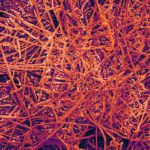Lien vers Pubmed [PMID] – 32185898
Cell. Microbiol. 2020 Apr;22(4):e13169
By modifying the host cell transcription programme, pathogenic bacteria disrupt a wide range of cellular processes and take control of the host’s immune system. Conversely, by mobilising a network of defence genes, the host cells trigger various responses that allow them to tolerate or eliminate invaders. The study of the molecular basis of this crosstalk is crucial to the understanding of infectious diseases. Although research has long focused on the targeting of eukaryotic DNA-binding transcription factors, more recently, another powerful way by which bacteria modify the expression of host genes has emerged: chromatin modifications in the cell nucleus. One of the most prolific bacterial models in this area has been Listeria monocytogenes, a facultative intracellular bacterium responsible for serious food-borne infections. Here, we aim to highlight the contribution of this model to the field of bacteria-mediated chromatin modifications. We will first recall the general principles of epigenetic regulation and then illustrate five mechanisms that mobilise the epigenetic machinery in response to Listeria factors, either through bacterial molecular patterns, a toxin, an invasion protein, or nucleomodulins. Strategies used by Listeria to control the expression of host genes at the chromatin level, by activation of cytosolic signalling pathways or direct targeting of epifactors in the nucleus, have contributed to the emergence of a new discipline combining cellular microbiology and epigenetics: “patho-epigenetics.”

